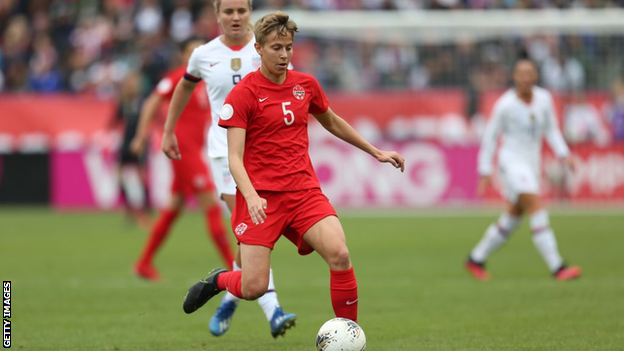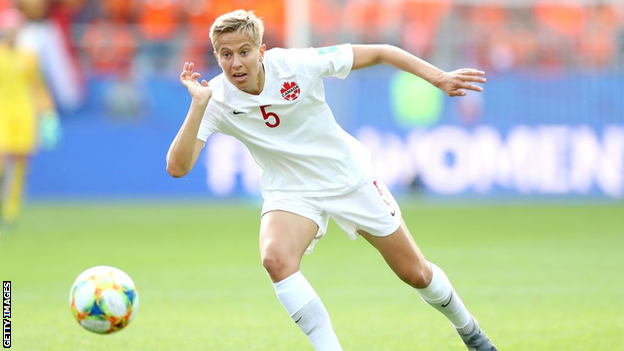Quinn: Canada's transgender footballer on being 'visible' and playing at the Olympics
- Published
Canada player Quinn talks about coming out as transgender
Throughout this article Quinn is referred to as 'they/their' rather than 'she/her' to respect their wishes around use of pronouns. Quinn has also dispensed with what they call their "dead" former first name.
"When I was figuring out who I was, it was really scary and I didn't really understand if I had a future in football, if I had a future in life."
Quinn doesn't like living in the spotlight. Yet as a professional athlete, it often comes with the territory.
But little provides a greater platform than sport, and despite being a self-proclaimed introvert, Quinn recognised the power of using that platform and of "being visible".
And so, earlier this month, Quinn, a defender for Canada's women's football team, publicly came out as transgender.
"It's really difficult when you don't see people like yourself in the media or even around you or in your profession. I was operating in the space of being a professional footballer and I wasn't seeing people like me," Quinn tells BBC Sport.
Quinn, who has five goals and 59 caps for Canada, won Olympic bronze at Rio 2016 and played at the 2019 World Cup.
The 25-year-old remains eligible to compete in women's sport despite identifying as transgender because gender identity differs from a person's sex - their physical biology.
Most people, unless they're non-binary, have a gender identity of male or female.
Quinn was assigned female at birth but after many years of questioning themselves, realised their own gender identity did not match their sex.
In an exclusive interview, Quinn tells BBC Sport how there are still "spaces of ignorance" in women's football, their Olympic ambitions, and their concern as sporting governing bodies start to weigh up transgender policies.
Allow Instagram content?
This article contains content provided by Instagram. We ask for your permission before anything is loaded, as they may be using cookies and other technologies. You may want to read Meta’s Instagram cookie policy, external and privacy policy, external before accepting. To view this content choose ‘accept and continue’.
'More learning to be done' in women's football
On coming out as transgender in an Instagram post earlier this month, it marked the end of Quinn living "essentially two different lives".
"I really didn't like feeling like I had a disconnect between different parts of my life, being a public figure, and so I wanted to live authentically," they say.
"I think being visible is huge and it's something that helped me when I was trying to figure out my identity.
"I wanted to pass that along and then hopefully other people will come out as well if they feel safe to do so and I can create a safer space for them."
Quinn had their first interactions with transgender people at college and it was at that point, they say, that they "really understood that was who I was".

Quinn has 59 caps for Canada
"I couldn't verbalise what I was feeling before and I didn't have the right language to articulate how I was feeling before that.
"We live in a world that is so binary and I have been receiving messages ever since I was a young child about how I should act, how I should portray myself and how I should be and anything that deviated from that was essentially wrong.
"I wanted to live my authentic self, dress the way I wanted to, present the way I wanted to, and that wasn't always seen as positive, so that was really hard to digest."
Those in Quinn's personal circle have known their identity for some time, and the reaction from Canada team-mates, who they told in an email, was "overwhelmingly positive".
For "the most part", women's football is a supportive space, adds Quinn - who is currently on loan at Swedish club Vittsjo GIK from the American National Women's Soccer League (NWSL) side OL Reign - but there are still "spaces of ignorance".
"It's been a really long ride with [Canada team-mates] and they are people who I consider some of my best friends," Quinn says. "A lot of those players have been my concrete supports going through this process.
"I think when looking at the larger realm of women's football there still are spaces of ignorance and there is a little bit of push back, so those are definitely opinions that I want to see change over a period of time and to create a completely safe space for me, because quite honestly I don't think sport is there yet and women's football is there yet."
Despite their team-mates' acceptance and support, Quinn admits there is "still a lot of learning to be done".
"I'm really open for my team-mates wanting to talk to me," Quinn says. "I wasn't taught throughout the course of my life what it meant to be trans, all the language around it. I think that's something that's new for a lot of people.
"Once I started living more authentically in my life, whether that's just how I present myself or coming out to them as trans, I think they've all said to me it's really incredible to see me just live my authentic self and how I've exuded a different level of confidence, and how it just fits with who I am as a person."
Being 'openly trans' at an Olympics

Quinn made three appearances at the 2019 Women's World Cup in France
Quinn hopes to take their visibility as a transgender athlete to sport's greatest level by playing at next year's rearranged Olympics in Tokyo, something which would make them "incredibly proud".
"That was one of the reasons why I came out publicly, it's because I want to be visible and I think the Olympics is a massive platform to have that visibility," Quinn adds.
"It's my hope that I might be the first and that's really exciting, but it's also my hope that there are other people following in my footsteps and so I hope that it opens the door to other trans athletes being represented at the Olympics."
Since 2004, transgender athletes have been allowed to compete at the Olympics.
Those who have transitioned from female to male are allowed to do so without restriction. However, current International Olympic Committee guidelines, issued in November 2015, state that transgender women (those who have transitioned from male to female) must suppress testosterone levels for at least 12 months before competition.
And specifically in athletics, the Court of Arbitration for Sport's (Cas) most recent ruling permitted the restriction of testosterone levels in female runners to protect "the integrity of female athletics" - but raised concerns about how those rules would be applied.
Explicit IOC guidelines do not exist for non-binary athletes - those whose gender identity falls outside the categories of man or woman.
The IOC says it is trying to strike the right balance, external of fair and equal competition, while not excluding trans athletes from the opportunity to participate.
These rules will be in place for Tokyo 2020 but a consultation process is ongoing.
Critics of the IOC's current position argue people born biologically male who transition after puberty retain a physical advantage over their competitors, with former Olympic swimmer Sharron Davies saying women's sport should not be used as a "live experiment" on the issue of transgender athletes.
Quinn's announcement also comes at a time when various governing bodies are weighing up their own policies towards transgender athlete participation, with World Rugby proposing to ban trans women from contact rugby.
"I think it is really concerning," Quinn says.
"I think that we need to focus on why we're in sports in the first place and the celebration of the excellence of our bodies."
"I'm just another person doing the thing that I love to do and I get the privilege do that every day on the pitch."